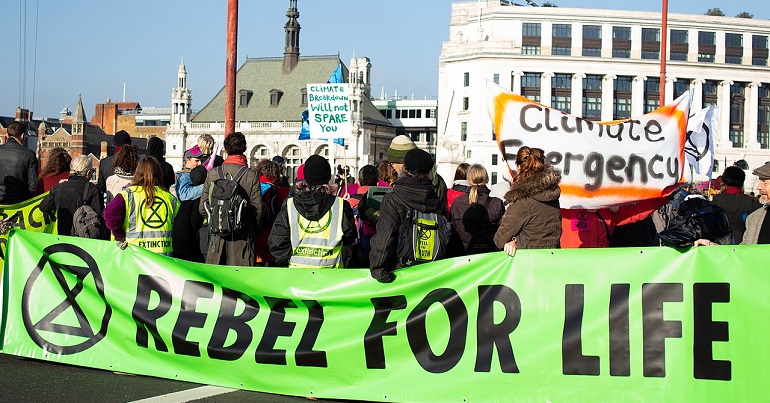Breaking the law to change the law

Last week, I appeared in court to plead not guilty to aggravated trespass, having been arrested as part of the Extinction Rebellion protests. As an elected councillor, I believe there is a gap in the law that means protesters like myself are prosecuted while institutions like Barclays Bank are allowed to carry on with fossil fuel activity that should be illegal. This is an edited version of the statement I would have made if I had pleaded guilty:
The ward I represent in Norwich has a high level of poverty and many children and elderly people. During last year’s heatwave, there was a death toll of nearly 700 more than the average for the time of year. These were mainly older people, stuck in inner city flats and houses and unable to escape the heat. There were warnings that heat-related deaths could triple to more than 7,000 a year by 2040. Now, as a councillor, I regularly examine plans for new developments, including many on the banks of the river Wensum in Norwich, and I can see that the threat of flooding in my own home and the homes of residents in my ward is increasing. Once again, as is now the case in Yorkshire and Derbyshire, it will be the poorest and most vulnerable who are most at risk.
I believe that the first duty of any government is to protect its citizens – that is what the law should exist for. Yet local authorities are having their ability to carry out this duty severely cut by the lack of seriousness at national government level, and by the lack of an adequate legal framework.
Take the example of Barclays. In October, I superglued my hand inside the revolving door of Barclays HQ in Canary Wharf. I chose to do this as Barclays is Europe’s largest funder of fossil fuels. Since 2016, it has invested more than £26billion in oil, gas, and the notoriously destructive tar sands of Canada – depriving First Nation Canadians of their rights to land as well as extracting some of the most dirty fuel in the world.
While I and other Extinction Rebellion protesters – many of us ordinary people, not wealthy – face fines and criminal convictions, the executives and Government ministers who decide to continue funding fossil fuels – in full knowledge of what this means for the overheating of our earth – are rewarded with bonuses and massive profits.
I believe that there is a gap in the law here. The activist and lawyer Polly Higgins, who sadly died earlier this year, called for “Ecocide” to be inscribed in law. This would provide a legal duty on governments to protect their citizens against dangerous practices that deprive humans and other creatures of the necessary means of life – clean air, clean water, a habitable climate.
I recognise that compromises must be made at times, and that it is not always possible to protect everyone. But on this one point, the facts and the requirements are very clear – fossil fuels are killing us, and killing the earth too. Since alternatives do exist, there must be a reflection in both law and governance of a moral position. The continued extraction, selling, and subsidising of fossil fuels is morally unacceptable for anybody whose business is the public interest.
I have tried as a representative of a local authority to achieve change, and I shall continue to do so. But let us remember that the UK offers more in subsidies to the fossil fuel industry than any other country in Europe – £10.5 billion a year, according to the European Commission – while local authorities are having to fight tooth and nail to secure funding for public transport improvements, let alone social care or housing. Without a legal system to protect residents in my ward in Norwich, we have to challenge the law itself.
Jamie Osborn is a Green Party councillor for Mancroft (Norwich)




Leave a Reply